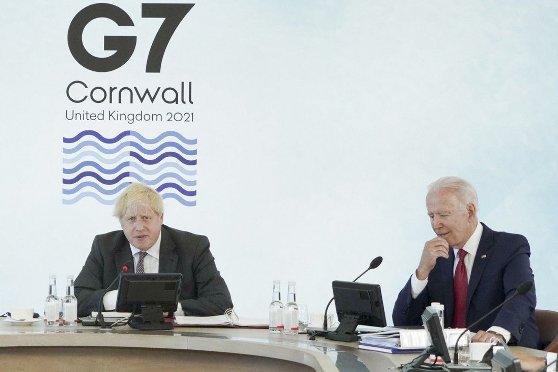G7 leaders call for fresh probe into origin of COVID-19 pandemic
By Benedikt von Imhoff, Christoph Meyer and Stephen Lowman
FALMOUTH, England – G7 leaders called for a new investigation into the origin of the COVID-19 pandemic, according to their final communiqué on Sunday (13), a move likely to draw the ire of China.
“We also call for a timely, transparent, expert-led, and science-based WHO-convened Phase 2 COVID-19 Origins study including, as recommended by the experts’ report, in China,” the document said.
The first infections with the virus were discovered in Wuhan in December 2019. A joint team of WHO experts and Chinese researchers had carried out investigations in the central Chinese metropolis at the beginning of the year. But there were accusations that the Chinese side had not cooperated transparently and sufficiently.
The United States and the European Union are among those who have been urging another look at how the pandemic may have started, including whether it is possible the virus leaked from a Wuhan lab.
Tedros Adhanom Ghebreyesus, the head of the World Health Organization (WHO), said on Saturday (12) the question has been discussed at the G7 meetings in England over the weekend.
Earlier this year the WHO-led team that returned from China did not rule out the theory of some sort of laboratory accident but called it “extremely unlikely.”
In its final report in March, it went on to say that the origin of the pandemic was in all likelihood in the animal kingdom.
Bats are considered a possible source of the coronavirus, and it is “likely to very likely” that the virus jumped to humans via an intermediate host, it added. Following the outbreak, Beijing also banned the widespread trade in wild animals in China.
Beijing has also theorized that the virus did not necessarily originate in China.
British Prime Minister Boris Johnson said it was reasonable to have an open mind.
“At the moment, the advice that we have had is that it doesn’t look as though this particular disease of zoonotic origin came from a lab,” he said on Sunday. “Clearly anybody sensible would want to keep an open mind about that.”
He stressed, however, that there were problems with diseases moving from animals to humans, and here especially with wild animal markets in South-East Asia, for example.
He stressed that the G7 group wanted to strengthen the WHO’s ability to allow inspectors to conduct independent investigations.
Meanwhile, G7 nations have promised to deliver 1 billion Covid-19 vaccines to poorer countries, Johnson said at the conclusion of a three-day summit in England.
The amount will be met through a mix of countries making outright donations as well as payments to the WHO-backed COVAX vaccine-sharing program, Johnson said, but further details on the allocations were not immediately available.
Johnson had previously announced that Britain would donate 100 million doses from its own surplus. The United States said this week it plans to donate 500 million Pfizer vaccine doses globally, on top of 80 million doses earlier pledged.
The WHO has estimated that 11 billion doses are needed to quash the pandemic. That is far more than the amount set out for donation by the G7, drawing criticism from aid groups.
“It sounds better than it is,” Fiona Uellendahl of the children’s charity World Vision had said earlier about the 1-billion figure.
Romilly Greenhill of the One Campaign organization said that there was a “mysterious fog” surrounding the figures cited and it was unclear whether the pledges were actually new or just renewed.
The G7 has also come under fire for not fully backing a lifting of patent protections for coronavirus vaccines, which supporters say would boost supplies and save lives.
-dpa


